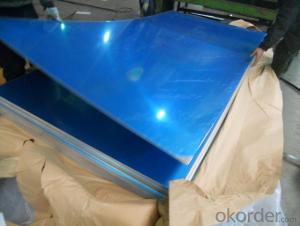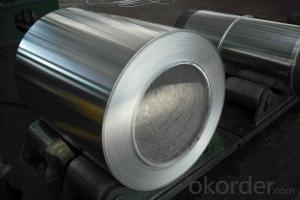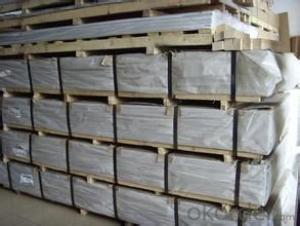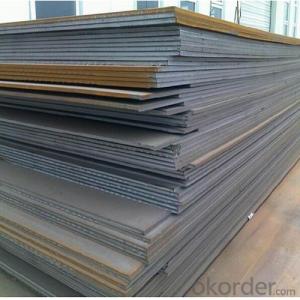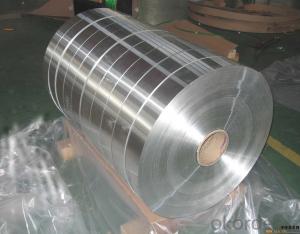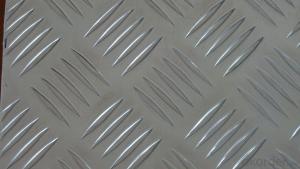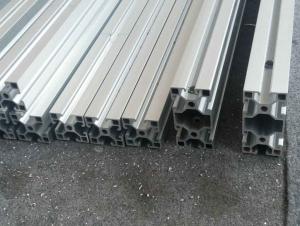1.8 Thick Aluminum Sheets for Construction and Car Bodies
- Loading Port:
- Shanghai
- Payment Terms:
- TT OR LC
- Min Order Qty:
- 8 m.t.
- Supply Capability:
- 1000 m.t./month
OKorder Service Pledge
OKorder Financial Service
You Might Also Like
Specification
Structure of Aluminium Sheet for Construction and Car Bodies Description:
Coated aluminum coil/sheet are of a wide range of colors, which gives wonderful appearance no matter in residential and commercial constructions of great exhibition centers.
The coated aluminum coil/sheet have been widely used in the fields of construction and decoration( garage doors, ceiling etc.), electronic appliances, lighting decoration, air-condition air pipes, sandwich panels and drainages etc.
Main Features of theAluminium Sheet for Construction and Car Bodies:
1) High flexibility
2) Impact resistance
3) Excellent weather-proof durability
4) Anti-ultraviolet
5) High erosion resist
Images of the Aluminium Sheet for Construction and Car Bodies:
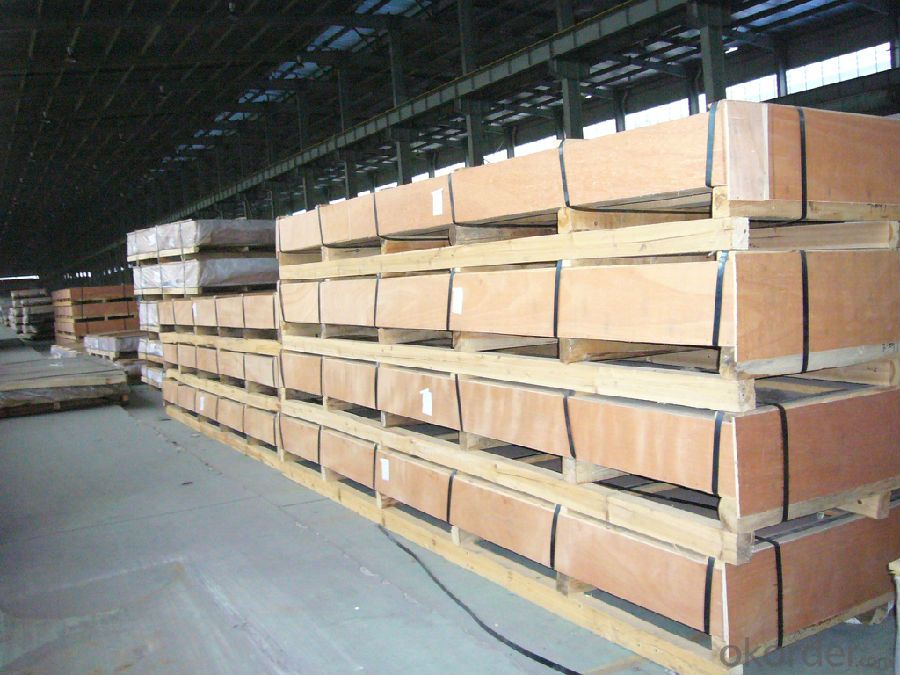
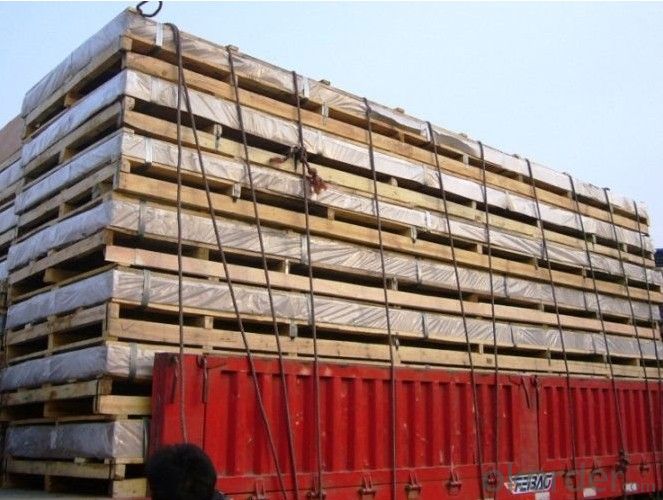
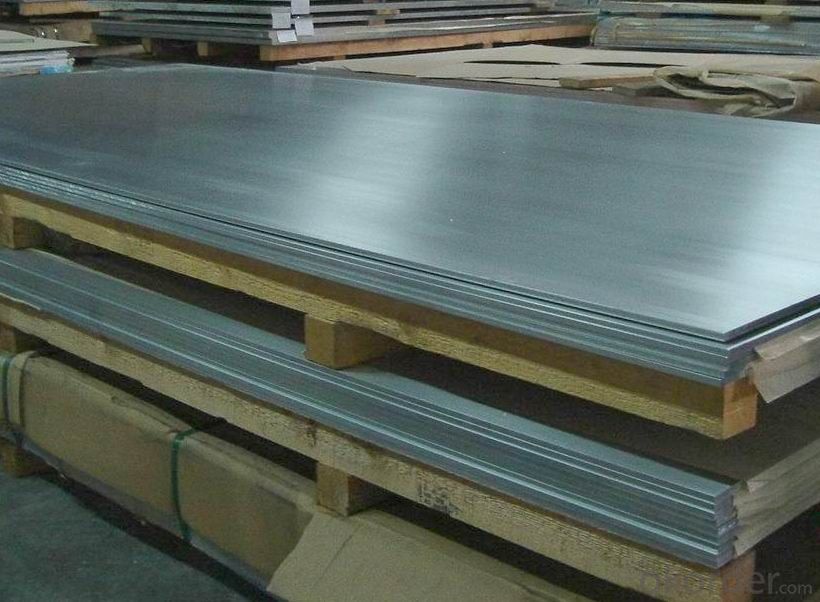
Aluminium Sheet for Construction and Car Bodies Specification:
Alloy | A1100,A3003,A1050,A8011 etc |
Temper | H16,H18,H24 |
Thickness | From 0.024mm to 1.2mm |
Width | Standard width:1240mm |
Special width:1300mm,1520mm,1570mm,1595mm | |
Diameter | Standard dia:1200mm |
Interior dia:150mm,405mm,505mm | |
Weight | 2.5 T/coil,3.0 T/coil |
Coating | PE, PVDF, AC |
Surface | Embossed, mill finish, coated |
Color | AS to code RAL |
Gloss | 10-90%(EN ISO-2813:1994) |
Coating Thickness | PE: more than 18 micron |
PVDF: more than 25 micron | |
Coating Hardness (pencil resistance) | More than 2h |
Coating adhesion | 5J(EN ISO-2409:1994) |
Impact Resistance | No peeling or cracking(50 kg/cm,ASTMD-2794:1993) |
Flexibility (T-bend) | 2T |
MEK resistance | More than 100 |
FAQ Aluminium Sheet for Construction and Car Bodies:
a.What is monthly capacity
---CNBM is one stated own company and our monthly capacity is about 2000tons.
b. Now which countries do you export your goods?
---Now we export to South East Asia,Africa, North America,South America ect.
- Q: Other then pop cans, what else is aluminum that can be recycled?
- Anything made of aluminum can be recycled. Aluminum cans are just a visible item that can be used for social engineering purposes. The cans also are very pure form of the metal. You will find aluminum in many things, from parts in your computer, major parts in your family car, pots, pans, kitchen items, tools, display items, structural supports for various things, boats, canoes, airplanes, and the list is long. Fact is, it would be difficult to find many items where aluminum was NOT used. Although everything that is metal that a magnet would not stick to, is not always aluminum. ANY metal can be recycled, and most metals can be sorted for recycling when you find a recycling plant that will buy the materials. Some of the metals need to be in large quantity, or weight in order to be worthwhile sorting. Some things like batteries can be sorted by general type. Some of those are easier to break down to component metals than others. Some have hazardous substances in them so need care in storage, and some have hazardous substances that need special care in shipping them. But they are exception.
- Q: This question asks if aluminum sheets can be utilized for both exterior and interior purposes.
- <p>Yes, aluminum sheets can be used for both exterior and interior applications. They are popular for exterior use due to their durability, resistance to weather, and low maintenance requirements. For interior applications, aluminum sheets are valued for their lightweight, easy installation, and aesthetic appeal. They are commonly used in construction, automotive, and aerospace industries, among others. However, it's important to note that specific treatments or coatings may be necessary to enhance their performance in different environments.</p>
- Q: Explain the distinction between aluminum sheets based on their thickness.
- <p>Aluminum sheets with different thicknesses primarily differ in their strength, weight, and applications. Thicker sheets offer greater strength and rigidity, making them suitable for structural applications or heavy-duty uses. In contrast, thinner sheets are lighter and more flexible, ideal for applications requiring formability or where weight is a concern, such as in the automotive or aerospace industries. The choice of thickness depends on the specific requirements of the project, including load-bearing needs, durability, and aesthetic considerations.</p>
- Q: Can aluminum sheets be used for electrical busbars?
- Indeed, electrical busbars can utilize aluminum sheets. Aluminum possesses exceptional electrical and thermal conductivity attributes, making it an ideal material. Moreover, it boasts advantages such as being lightweight and cost-effective in comparison to copper and similar metals. Nevertheless, employing aluminum sheets for busbars necessitates certain considerations. Due to aluminum's higher resistance in comparison to copper, larger cross-sectional areas may be necessary to compensate for this discrepancy. Furthermore, it is vital to implement proper insulation and joint connections to prevent potential galvanic corrosion issues between the aluminum busbars and other metals within the electrical system. In summary, aluminum sheets can serve as a suitable choice for electrical busbars, but careful evaluation of the specific application requirements and design considerations is essential to ensure optimal performance and safety.
- Q: How do aluminum sheets perform in extreme weather conditions?
- Aluminum sheets are known for their exceptional performance in extreme weather conditions. Due to their inherent properties, aluminum sheets are highly resistant to corrosion and can withstand harsh environmental elements such as rain, snow, and extreme temperature fluctuations. In hot weather, aluminum sheets have the ability to reflect sunlight and dissipate heat, preventing them from warping or deforming. This makes them well-suited for use in areas with high temperatures or direct exposure to sunlight. Similarly, in cold weather, aluminum sheets do not become brittle or lose their strength, making them reliable in freezing temperatures or areas prone to heavy snowfall. They have a low coefficient of thermal expansion, meaning they can withstand contraction and expansion without cracking or becoming damaged. Furthermore, aluminum sheets have excellent resistance to moisture, preventing them from rusting or corroding when exposed to rain or high humidity levels. This makes them ideal for use in coastal areas or regions with heavy rainfall. Aluminum sheets are also lightweight, yet durable, which allows them to withstand high winds and severe storms without compromising their structural integrity. This makes them a preferred choice for applications such as roofing, siding, and outdoor signage in areas prone to hurricanes or strong winds. Overall, aluminum sheets demonstrate remarkable performance in extreme weather conditions, making them a reliable and versatile material for various outdoor applications.
- Q: Can aluminum sheets be easily shaped or bent into desired forms?
- Yes, aluminum sheets can be easily shaped or bent into desired forms. Aluminum is a highly malleable metal, which means it can be easily manipulated without breaking or cracking. Its low density and high strength-to-weight ratio make it an ideal choice for various applications where shaping or bending is required. Aluminum sheets can be shaped or bent using a variety of methods, including press-braking, roll-forming, or using specialized tools such as a sheet metal brake. The ease of shaping or bending aluminum sheets also makes it a popular choice for industries such as automotive, aerospace, construction, and manufacturing, where customized forms and designs are often needed.
- Q: what's the difference between zinc sheet and aluminum sheet?
- Only the zinc sheet reacts after adding concentrated nitric acid in drops ,zinc is amphoteric.
- Q: I am ultimately looking to have a bike that is good for both everday commuting and touring with panniers/racks long distance with camping. From what I've read on the internet steel frames are more forgiving and ride smoother. The guy at my local bike shop tells me aluminum frames have more flex and ride better. I don't know if he's just trying to make a sale (Giant dealer) or to trust him, unfortunately the staff there are all just racers not tourers. If you can recommend any brands/models to check out that'd be good. From my research thus far I am in love with Co Motion bikes, just not the price! I'm looking at $1000 max for a good touring bike. Thanks!
- Surly LHT Surly Cross Check - suitable for lighter touring Soma Saga Salsa Fargo - heavy duty rig Salsa Casseroll - for light touring Kona Sutra - another mtb-based tourer Bob Jackson World Tour Nothing is as cheap as the nashbar alum frame. No reason to completely rule out aluminum options, though. Steel offers a nice ride, but frames made with nicer steel tubes are probably out of your price range. Aluminim can be plenty strong, especially if it's a hybrid-type frame. For example, Trek's 7.3 would be a fine platform for building a touring bike, yet the frame is aluminum...but plenty strong...and the quality of the frame will exceed an LHT. If you've got to have steel and don't have much funds available, even for a $450 frameset, consider sourcing an older (late-80s to mid-90s) rigid mtb. These had longer chainstays and wheelbases than modern mountain bikes, and the tubing and construction was naturally durable. Yeah, I see your point #2, but if wishes were horses...
- Q: Can aluminum sheets be used for water tanks?
- Yes, aluminum sheets can be used for water tanks. Aluminum is a corrosion-resistant material and is commonly used in the construction of water tanks due to its durability and ability to withstand harsh weather conditions.
- Q: What is the fatigue strength of aluminum sheets?
- The fatigue strength of aluminum sheets depends on various factors such as the alloy, thickness, and manufacturing process. Generally, aluminum alloys have good fatigue strength compared to other materials. However, the exact fatigue strength can vary significantly and must be determined through specific testing and analysis for each particular aluminum sheet.
Send your message to us
1.8 Thick Aluminum Sheets for Construction and Car Bodies
- Loading Port:
- Shanghai
- Payment Terms:
- TT OR LC
- Min Order Qty:
- 8 m.t.
- Supply Capability:
- 1000 m.t./month
OKorder Service Pledge
OKorder Financial Service
Similar products
Hot products
Hot Searches
Related keywords
